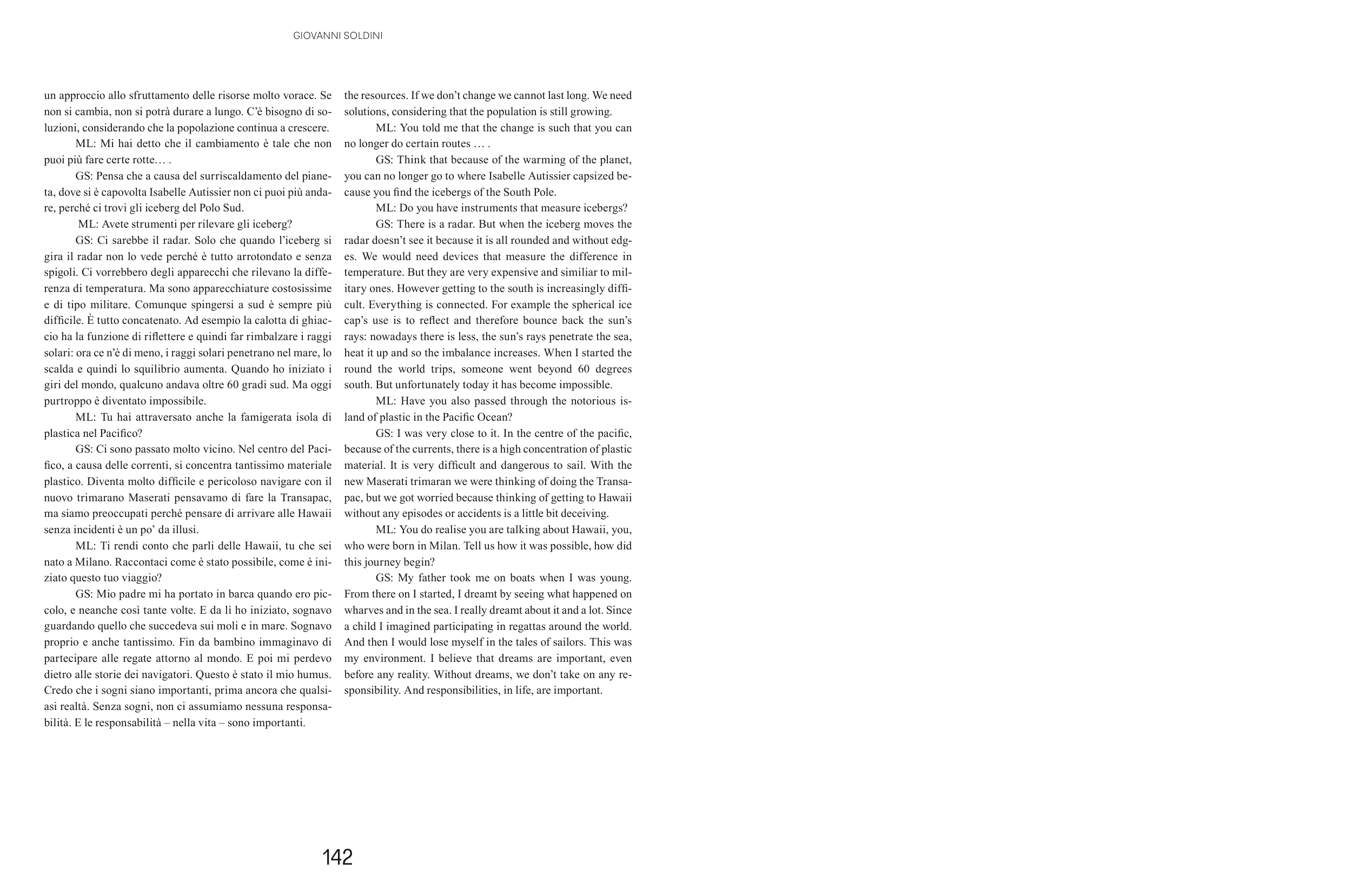142
un approccio allo sfruttamento delle risorse molto vorace. Se
non si cambia, non si potrà durare a lungo. C’è bisogno di so-
luzioni, considerando che la popolazione continua a crescere.
ML: Mi hai detto che il cambiamento è tale che non
puoi più fare certe rotte… .
GS: Pensa che a causa del surriscaldamento del piane-
ta, dove si è capovolta Isabelle Autissier non ci puoi più anda-
re, perché ci trovi gli iceberg del Polo Sud.
ML: Avete strumenti per rilevare gli iceberg?
GS: Ci sarebbe il radar. Solo che quando l’iceberg si
gira il radar non lo vede perché è tutto arrotondato e senza
spigoli. Ci vorrebbero degli apparecchi che rilevano la diffe-
renza di temperatura. Ma sono apparecchiature costosissime
e di tipo militare. Comunque spingersi a sud è sempre più
diffi cile. È tutto concatenato. Ad esempio la calotta di ghiac-
cio ha la funzione di rifl ettere e quindi far rimbalzare i raggi
solari: ora ce n’è di meno, i raggi solari penetrano nel mare, lo
scalda e quindi lo squilibrio aumenta. Quando ho iniziato i
giri del mondo, qualcuno andava oltre 60 gradi sud. Ma oggi
purtroppo è diventato impossibile.
ML: Tu hai attraversato anche la famigerata isola di
plastica nel Pacifi co?
GS: Ci sono passato molto vicino. Nel centro del Paci-
fi co, a causa delle correnti, si concentra tantissimo materiale
plastico. Diventa molto diffi cile e pericoloso navigare con il
nuovo trimarano Maserati pensavamo di fare la Transapac,
ma siamo preoccupati perché pensare di arrivare alle Hawaii
senza incidenti è un po’ da illusi.
ML: Ti rendi conto che parli delle Hawaii, tu che sei
nato a Milano. Raccontaci come è stato possibile, come è ini-
ziato questo tuo viaggio?
GS: Mio padre mi ha portato in barca quando ero pic-
colo, e neanche così tante volte. E da lì ho iniziato, sognavo
guardando quello che succedeva sui moli e in mare. Sognavo
proprio e anche tantissimo. Fin da bambino immaginavo di
partecipare alle regate attorno al mondo. E poi mi perdevo
dietro alle storie dei navigatori. Questo è stato il mio humus.
Credo che i sogni siano importanti, prima ancora che qualsi-
asi realtà. Senza sogni, non ci assumiamo nessuna responsa-
bilità. E le responsabilità – nella vita – sono importanti.
the resources. If we don’t change we cannot last long. We need
solutions, considering that the population is still growing.
ML: You told me that the change is such that you can
no longer do certain routes … .
GS: Think that because of the warming of the planet,
you can no longer go to where Isabelle Autissier capsized be-
cause you fi nd the icebergs of the South Pole.
ML: Do you have instruments that measure icebergs?
GS: There is a radar. But when the iceberg moves the
radar doesn’t see it because it is all rounded and without edg-
es. We would need devices that measure the difference in
temperature. But they are very expensive and similiar to mil-
itary ones. However getting to the south is increasingly diffi -
cult. Everything is connected. For example the spherical ice
cap’s use is to refl ect and therefore bounce back the sun’s
rays: nowadays there is less, the sun’s rays penetrate the sea,
heat it up and so the imbalance increases. When I started the
round the world trips, someone went beyond 60 degrees
south. But unfortunately today it has become impossible.
ML: Have you also passed through the notorious is-
land of plastic in the Pacifi c Ocean?
GS: I was very close to it. In the centre of the pacifi c,
because of the currents, there is a high concentration of plastic
material. It is very diffi cult and dangerous to sail. With the
new Maserati trimaran we were thinking of doing the Transa-
pac, but we got worried because thinking of getting to Hawaii
without any episodes or accidents is a little bit deceiving.
ML: You do realise you are talking about Hawaii, you,
who were born in Milan. Tell us how it was possible, how did
this journey begin?
GS: My father took me on boats when I was young.
From there on I started, I dreamt by seeing what happened on
wharves and in the sea. I really dreamt about it and a lot. Since
a child I imagined participating in regattas around the world.
And then I would lose myself in the tales of sailors. This was
my environment. I believe that dreams are important, even
before any reality. Without dreams, we don’t take on any re-
sponsibility. And responsibilities, in life, are important.
GIOVANNI SOLDINI


